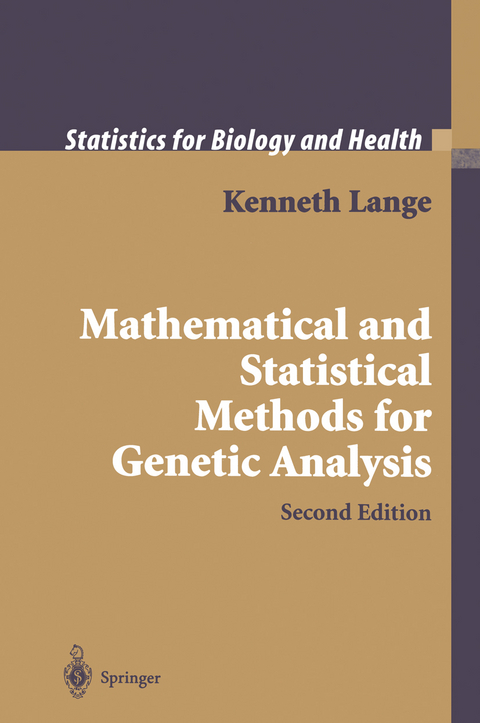
Mathematical and Statistical Methods for Genetic Analysis
Seiten
2002
|
2nd ed. 2002
Springer-Verlag New York Inc.
978-0-387-95389-2 (ISBN)
Springer-Verlag New York Inc.
978-0-387-95389-2 (ISBN)
Equips graduate students in the mathematical sciences to understand and model the epidemiological and experimental data encountered in genetics research. This book serves as a graduate text and a reference book.
During the past decade, geneticists have cloned scores of Mendelian disease genes and constructed a rough draft of the entire human genome. The unprecedented insights into human disease and evolution offered by mapping, cloning, and sequencing will transform medicine and agriculture. This revolution depends vitally on the contributions of applied mathematicians, statisticians, and computer scientists. Mathematical and Statistical Methods for Genetic Analysis is written to equip students in the mathematical sciences to understand and model the epidemiological and experimental data encountered in genetics research. Mathematical, statistical, and computational principles relevant to this task are developed hand in hand with applications to population genetics, gene mapping, risk prediction, testing of epidemiological hypotheses, molecular evolution, and DNA sequence analysis. Many specialized topics are covered that are currently accessible only in journal articles. This second edition expands the original edition by over 100 pages and includes new material on DNA sequence analysis, diffusion processes, binding domain identification, Bayesian estimation of haplotype frequencies, case-control association studies, the gamete competition model, QTL mapping and factor analysis, the Lander-Green-Kruglyak algorithm of pedigree analysis, and codon and rate variation models in molecular phylogeny. Sprinkled throughout the chapters are many new problems.
During the past decade, geneticists have cloned scores of Mendelian disease genes and constructed a rough draft of the entire human genome. The unprecedented insights into human disease and evolution offered by mapping, cloning, and sequencing will transform medicine and agriculture. This revolution depends vitally on the contributions of applied mathematicians, statisticians, and computer scientists. Mathematical and Statistical Methods for Genetic Analysis is written to equip students in the mathematical sciences to understand and model the epidemiological and experimental data encountered in genetics research. Mathematical, statistical, and computational principles relevant to this task are developed hand in hand with applications to population genetics, gene mapping, risk prediction, testing of epidemiological hypotheses, molecular evolution, and DNA sequence analysis. Many specialized topics are covered that are currently accessible only in journal articles. This second edition expands the original edition by over 100 pages and includes new material on DNA sequence analysis, diffusion processes, binding domain identification, Bayesian estimation of haplotype frequencies, case-control association studies, the gamete competition model, QTL mapping and factor analysis, the Lander-Green-Kruglyak algorithm of pedigree analysis, and codon and rate variation models in molecular phylogeny. Sprinkled throughout the chapters are many new problems.
Basic Principles of Population Genetics.- Counting Methods and the EM Algorithm.- Newton's Method and Scoring.- Hypothesis Testing and Categorical Data.- Genetic Identity Coefficients.- Applications of Identity Coefficients.- Computation of Mendelian Likelihoods.- The Polygenic Model.- Descent Graph Models.- Molecular Phylogeny.- Radiation Hybrid Mapping.- Models of Recombination.- Sequence Analysis.- Poisson Approximation.- Diffusion Processes.
| Erscheint lt. Verlag | 3.6.2003 |
|---|---|
| Reihe/Serie | Statistics for Biology and Health |
| Zusatzinfo | XVIII, 370 p. |
| Verlagsort | New York, NY |
| Sprache | englisch |
| Maße | 156 x 234 mm |
| Themenwelt | Mathematik / Informatik ► Mathematik ► Angewandte Mathematik |
| Mathematik / Informatik ► Mathematik ► Statistik | |
| Mathematik / Informatik ► Mathematik ► Wahrscheinlichkeit / Kombinatorik | |
| Medizin / Pharmazie ► Medizinische Fachgebiete | |
| Studium ► 2. Studienabschnitt (Klinik) ► Humangenetik | |
| Studium ► Querschnittsbereiche ► Epidemiologie / Med. Biometrie | |
| Naturwissenschaften ► Biologie ► Genetik / Molekularbiologie | |
| ISBN-10 | 0-387-95389-2 / 0387953892 |
| ISBN-13 | 978-0-387-95389-2 / 9780387953892 |
| Zustand | Neuware |
| Informationen gemäß Produktsicherheitsverordnung (GPSR) | |
| Haben Sie eine Frage zum Produkt? |
Mehr entdecken
aus dem Bereich
aus dem Bereich
Eine sehr persönliche Geschichte | Der New York Times-Bestseller
Buch | Softcover (2023)
Ullstein Taschenbuch Verlag
21,99 €
Die revolutionäre Medizin von morgen (Lifespan)
Buch | Softcover (2020)
DuMont Buchverlag
16,00 €


